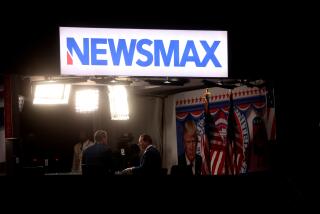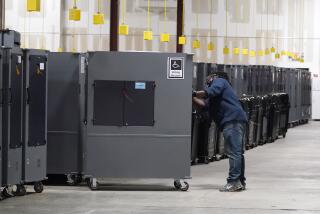Vote machine maker asks U.S. to probe alleged ties
- Share via
The maker of electronic voting machines to be used in next week’s election in parts of California and 15 other states sought Monday to quell concern about its connections with the Venezuelan government and its anti-American president, Hugo Chavez.
Executives at Oakland-based Sequoia Voting Systems Inc. and its parent company said they had asked for a U.S. government investigation “to put to rest baseless but persistent rumors” about the parent company’s ties to Chavez. The parent, Smartmatic Corp., is owned by Venezuelans.
“No foreign government from any country ever held a stake in Smartmatic, period,” said Smartmatic’s Venezuelan president, Antonio Mugica, at a Washington news conference. “We are definitely concerned about the allegations which have been published that are utterly false.”
Sequoia provides voting machine terminals in Riverside, San Bernardino, Santa Clara, Alameda and 16 other California counties.
The news conference was called after reports about Smartmatic and concerns about the reliability of electronic voting machines in general. In addition, Smartmatic’s critics wonder whether it is a good idea for local governments to use voting machines from companies with ties to foreign countries -- especially ones such as Venezuela and its outspoken leader.
The concerns, reported in June by The Times and renewed in newspaper stories over the weekend, have drawn new attention to Smartmatic, its 2005 acquisition of Sequoia and its past and present connections with the Venezuelan government led by Chavez since 1999.
Last year, Venezuelan investors who own Smartmatic purchased Sequoia, the oldest manufacturer of election equipment in the United States, from British firm De La Rue.
Boca Raton, Fla.-based Smartmatic is owned through a series of trusts and holding companies in the Netherlands and the Caribbean island of Curacao in the Dutch Antilles.
Mugica said that Smartmatic, formed in 2000 with little capital, raised the money for the $16-million acquisition of Sequoia by participating in a $94-million contract with the Venezuelan government to furnish voting machines for a 2004 presidential recall election, won by Chavez.
Before the election, Smartmatic was part of a consortium that included a software company partly owned by a Venezuelan government agency. The company subsequently was purchased by Smartmatic, and the agency no longer has an ownership interest.
In June, The Times reported that an interagency U.S. panel -- the Committee on Foreign Investments in the United States -- had begun an informal inquiry into Smartmatic’s ownership of Sequoia. The probe was prompted by a request from Rep. Carolyn B. Maloney (D-N.Y.).
A Treasury Department spokeswoman said Monday that the probe had been raised to formal status and could be concluded in a couple of months.
The foreign investment committee is the obscure federal group that popped into the news last year after it approved an ultimately failed effort by Dubai Ports World, a state-owned United Arab Emirates company, to buy terminal operations at some U.S. ports.
“I’m very pleased that the Smartmatic investigation is moving forward,” Maloney said. “The ownership of a company that makes machines we use to exercise democracy should be checked from a national security standpoint like we did with the Dubai ports.”
A Smartmatic critic, Chicago City Alderman Edward Burke, also welcomed the probe. “This is something I tried to get going back in April,” he said.
Burke held a hearing last spring after the city and surrounding Cook County ran into numerous technical problems with new Sequoia equipment in the March primary elections.
“I think an election ought to be run by Americans,” said Burke, who noted that a number of Venezuelan technicians were involved in the Chicago election.
Sequoia officials blamed much of the Chicago problems on poor training of poll workers and predicted that voting would go more smoothly next week. Sequoia equipment is reliable, secure and poses no national security risk, Smartmatic attorney Jeff Bialos said.
The machines “could be run by a Martian, and the voting systems in use this election cycle will be reliable and accurate,” he said.
Election officials in California said they were confident that electronic voting machines made by Sequoia and other manufacturers would perform as expected on election day.
“California has the strictest voting system standards in the nation,” said Ashley Giovannettone, a spokeswoman for the secretary of state’s office in Sacramento.
Watchdog groups, however, said they remained wary of electronic voting machines whose software was the property of private companies.
“We shouldn’t have to wonder if our election results can be influenced by foreign or corporate interests,” said Kim Alexander, president of the California Voter Foundation.







